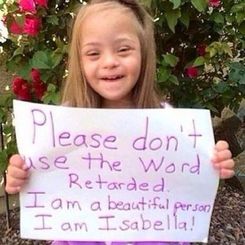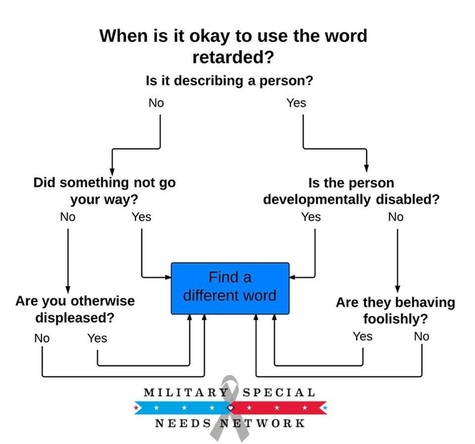
“THAT’S SO RETARDED”
By Louise van den Bergh, International Chairman of the Down Syndrome Group.
In today’s society, a day without hearing the words ‘retard’ and ‘retarded’ has become almost non-existent. We see these words in the media and hear them used by friends, family, and even celebrities. The casual use of these words has become passively ingrained in the minds of people from all walks of life. Why is this bad? Because over time, words evolve. The meaning of words can change so much that we end up forgetting the original intention behind their creation.
The word “retard” originates from the Latin verb retardare, meaning to hinder or make slow. This word was employed to only refer to people with intellectual disabilities. In 1985, “retard” was a widely accepted term in the medical community. However, as “retard” became interchangeable with words like “stupid” or “idiot,” it quickly became a derogatory term. Now in modern usage, “retard” is commonly used as an insult or as a way to describe anything displeasing or flawed.
Many people use this word without being aware of its implications or the emotional weight it carries. Some argue that when we use the word, we’re not doing it to offend anyone with intellectual disabilities. It’s just a word people use. It means nothing.
But what if those words we are using, that we claim are powerless and meaningless, are the exact words causing pain to individuals around the world? Even though our intention might not be to hurt people, we have all learned that words are powerful and can cause harm. Even if a word doesn’t seem cruel to you, it can hurt others around you. The word “retard” can be hurtful to individuals that happen to have an intellectual disability and to those that love someone with an intellectual disability.
Many individuals with intellectual disabilities do not want to be defined or labelled by their disability. They want to be respected and accepted - just like everyone else. By using the word “retard” or “retarded” for everything deemed negative, people are perpetuating the idea that objects that are so-called “retarded” are incompetent and inferior. People are essentially sending out the message that the last thing they want is to be “retarded.”
For this very reason, the use of the word “retard” is no longer considered socially acceptable. On October 5, 2010 the United States Senate passed Rosa’s Law, a legalisation that replaced the term ‘mental retardation’ with ‘intellectual disability’ in federal health, education and labour statutes. The law was named after Rosa Marcellino, a girl with Down syndrome, who (with the help of her parents and siblings) campaigned to remove the words ‘mentally retarded’ from the health and education code in her home state of Maryland.
The word ‘retard’ or ‘retarded’ is demeaning and disrespectful to people with disabilities. Despite your true intention, the word is damaging and hurts many individuals. It is a word with negative connotations and it only emphasizes the negative stereotypes already surrounding people with intellectual and developmental disabilities.
The words you use have the power to impact people. Words can make the difference between a great day and a bad day. You may think that what you say is meaningless and words are just words, but words reach people. Words hurt people.
Don’t refer to people with special needs as “retarded.” It’s inaccurate and derogatory. A person is not incompetent or inferior because of his or her disability. They are humans, with feelings, hopes, fears and dreams. People who use the word “retarded” often don’t understand the entire situation. There are plenty of other words you can use, such as “intellectually different” and “intellectually disabled.” You can also refer to people by their diagnosis. Often when you talk about a person’s diagnosis, you convey the idea that you understand their situation. Think before you speak and be careful when using the word “retarded.”
Picture Citations: http://mic.com/articles/85615/when-is-it-okay-to-say-retard-check-this-chart
http://www.opposingviews.com/i/health/photo-sums-why-you-should-stop-using-popular-slur
By Louise van den Bergh, International Chairman of the Down Syndrome Group.
In today’s society, a day without hearing the words ‘retard’ and ‘retarded’ has become almost non-existent. We see these words in the media and hear them used by friends, family, and even celebrities. The casual use of these words has become passively ingrained in the minds of people from all walks of life. Why is this bad? Because over time, words evolve. The meaning of words can change so much that we end up forgetting the original intention behind their creation.
The word “retard” originates from the Latin verb retardare, meaning to hinder or make slow. This word was employed to only refer to people with intellectual disabilities. In 1985, “retard” was a widely accepted term in the medical community. However, as “retard” became interchangeable with words like “stupid” or “idiot,” it quickly became a derogatory term. Now in modern usage, “retard” is commonly used as an insult or as a way to describe anything displeasing or flawed.
Many people use this word without being aware of its implications or the emotional weight it carries. Some argue that when we use the word, we’re not doing it to offend anyone with intellectual disabilities. It’s just a word people use. It means nothing.
But what if those words we are using, that we claim are powerless and meaningless, are the exact words causing pain to individuals around the world? Even though our intention might not be to hurt people, we have all learned that words are powerful and can cause harm. Even if a word doesn’t seem cruel to you, it can hurt others around you. The word “retard” can be hurtful to individuals that happen to have an intellectual disability and to those that love someone with an intellectual disability.
Many individuals with intellectual disabilities do not want to be defined or labelled by their disability. They want to be respected and accepted - just like everyone else. By using the word “retard” or “retarded” for everything deemed negative, people are perpetuating the idea that objects that are so-called “retarded” are incompetent and inferior. People are essentially sending out the message that the last thing they want is to be “retarded.”
For this very reason, the use of the word “retard” is no longer considered socially acceptable. On October 5, 2010 the United States Senate passed Rosa’s Law, a legalisation that replaced the term ‘mental retardation’ with ‘intellectual disability’ in federal health, education and labour statutes. The law was named after Rosa Marcellino, a girl with Down syndrome, who (with the help of her parents and siblings) campaigned to remove the words ‘mentally retarded’ from the health and education code in her home state of Maryland.
The word ‘retard’ or ‘retarded’ is demeaning and disrespectful to people with disabilities. Despite your true intention, the word is damaging and hurts many individuals. It is a word with negative connotations and it only emphasizes the negative stereotypes already surrounding people with intellectual and developmental disabilities.
The words you use have the power to impact people. Words can make the difference between a great day and a bad day. You may think that what you say is meaningless and words are just words, but words reach people. Words hurt people.
Don’t refer to people with special needs as “retarded.” It’s inaccurate and derogatory. A person is not incompetent or inferior because of his or her disability. They are humans, with feelings, hopes, fears and dreams. People who use the word “retarded” often don’t understand the entire situation. There are plenty of other words you can use, such as “intellectually different” and “intellectually disabled.” You can also refer to people by their diagnosis. Often when you talk about a person’s diagnosis, you convey the idea that you understand their situation. Think before you speak and be careful when using the word “retarded.”
Picture Citations: http://mic.com/articles/85615/when-is-it-okay-to-say-retard-check-this-chart
http://www.opposingviews.com/i/health/photo-sums-why-you-should-stop-using-popular-slur
Siblings with a Mission is an international organization established to serve and support siblings of individuals with special needs. All images are found on Google images and are solely used for education purposes. The stories and advice provided by Siblings with a Mission are not to be replaced by professional advice and counseling but to be considered as an additional source of support.

